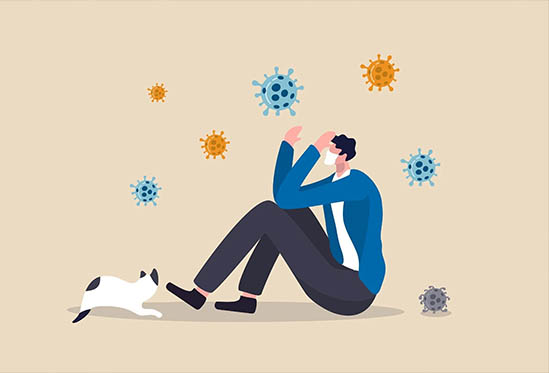
Original Investigation
September 7, 2022
Associations of Depression, Anxiety, Worry, Perceived Stress, and Loneliness Prior to Infection With Risk of Post–COVID-19 Conditions
Siwen Wang, MD1; Luwei Quan, BA2; Jorge E. Chavarro, ScD1,3,4; et alNatalie Slopen, ScD5; Laura D. Kubzansky, PhD5; Karestan C. Koenen, PhD3,5,6; Jae Hee Kang, ScD4; Marc G. Weisskopf, PhD2; Westyn Branch-Elliman, MD7,8; Andrea L. Roberts, PhD2
Author Affiliations Article Information
JAMA Psychiatry. Published online September 7, 2022. doi:10.1001/jamapsychiatry.2022.2640
COVID-19 Resource Center
Abstract
Importance Few risk factors for long-lasting (≥4 weeks) COVID-19 symptoms have been identified.
Objective To determine whether high levels of psychological distress before SARS-CoV-2 infection, characterized by depression, anxiety, worry, perceived stress, and loneliness, are prospectively associated with increased risk of developing post–COVID-19 conditions (sometimes called long COVID).
Design, Setting, and Participants This prospective cohort study used data from 3 large ongoing, predominantly female cohorts: Nurses’ Health Study II, Nurses’ Health Study 3, and the Growing Up Today Study. Between April 2020 and November 2021, participants were followed up with periodic surveys. Participants were included if they reported no current or prior SARS-CoV-2 infection at the April 2020 baseline survey when distress was assessed and returned 1 or more follow-up questionnaires.
Exposures Depression, anxiety, worry about COVID-19, perceived stress, and loneliness were measured at study baseline early in the pandemic, before SARS-CoV-2 infection, using validated questionnaires.
Main Outcomes and Measures SARS-CoV-2 infection was self-reported during each of 6 monthly and then quarterly follow-up questionnaires. COVID-19–related symptoms lasting 4 weeks or longer and daily life impairment due to these symptoms were self-reported on the final questionnaire, 1 year after baseline.
Results Of 54 960 participants, 38.0% (n = 20 902) were active health care workers, and 96.6% (n = 53 107) were female; the mean (SD) age was 57.5 (13.8) years. Six percent (3193 participants) reported a positive SARS-CoV-2 test result during follow-up (1-47 weeks after baseline). Among these, probable depression (risk ratio [RR], 1.32; 95% CI = 1.12-1.55), probable anxiety (RR = 1.42; 95% CI, 1.23-1.65), worry about COVID-19 (RR, 1.37; 95% CI, 1.17-1.61), perceived stress (highest vs lowest quartile: RR, 1.46; 95% CI, 1.18-1.81), and loneliness (RR, 1.32; 95% CI, 1.08-1.61) were each associated with post–COVID-19 conditions (1403 cases) in generalized estimating equation models adjusted for sociodemographic factors, health behaviors, and comorbidities. Participants with 2 or more types of distress prior to infection were at nearly 50% increased risk for post–COVID-19 conditions (RR, 1.49; 95% CI, 1.23-1.80). All types of distress were associated with increased risk of daily life impairment (783 cases) among individuals with post–COVID-19 conditions (RR range, 1.15-1.51).
Conclusions and Relevance The findings of this study suggest that preinfection psychological distress may be a risk factor for post–COVID-19 conditions in individuals with SARS-CoV-2 infection. Future work should examine the biobehavioral mechanism linking psychological distress with persistent postinfection symptoms.
Supplements that can help : Well mood , Hi-Rest® Capsules




